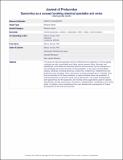Speciomics as a concept involving chemical speciation and omics
Abstract
The study of chemical speciation and the refinement and expansion of omics-based methods are both consolidated and highly active research fields. Although well established, such fields are extremely dynamic and are driven by the emergence of new strategies and improvements in instrumentation. In the case of omics-based studies, subareas including lipidomics, proteomics, metallomics, metabolomics and foodomics have emerged. Here, speciomics is being proposed as an “umbrella” term, that incorporates all of these subareas, to capture studies where the evaluation of chemical species is carried out using omics approaches. This paper contextualizes both speciomics and the speciome, and reviews omics applications used for species identification through examination of proteins, metalloproteins, metabolites, and nucleic acids. In addition, some implications from such studies and a perspective for future development of this area are provided.
Citation
Arruda , M A Z , de Jesus , J R , Blindauer , C A & Stewart , A J 2022 , ' Speciomics as a concept involving chemical speciation and omics ' , Journal of Proteomics , vol. 263 , 104615 . https://doi.org/10.1016/j.jprot.2022.104615
Publication
Journal of Proteomics
Status
Peer reviewed
ISSN
1874-3919Type
Journal item
Description
Funding: The authors thank the FAPESP (Fundação de Amparo à Pesquisa do Estado de São Paulo) [grant numbers 2014/50867-3, 2017/50085-3, 2018/25207-0, 2019/00018-3, 2019/24445-8, and 2020/08543-7], the CNPq (Conselho Nacional de Desenvolvimento Científico e Tecnológico, Brasília, Brazil) [grant number 303231/2020-3], and also the Biotechnology and Biological Sciences Research Council (BBSRC, United Kingdom, BB/V014684/1).Collections
Items in the St Andrews Research Repository are protected by copyright, with all rights reserved, unless otherwise indicated.

